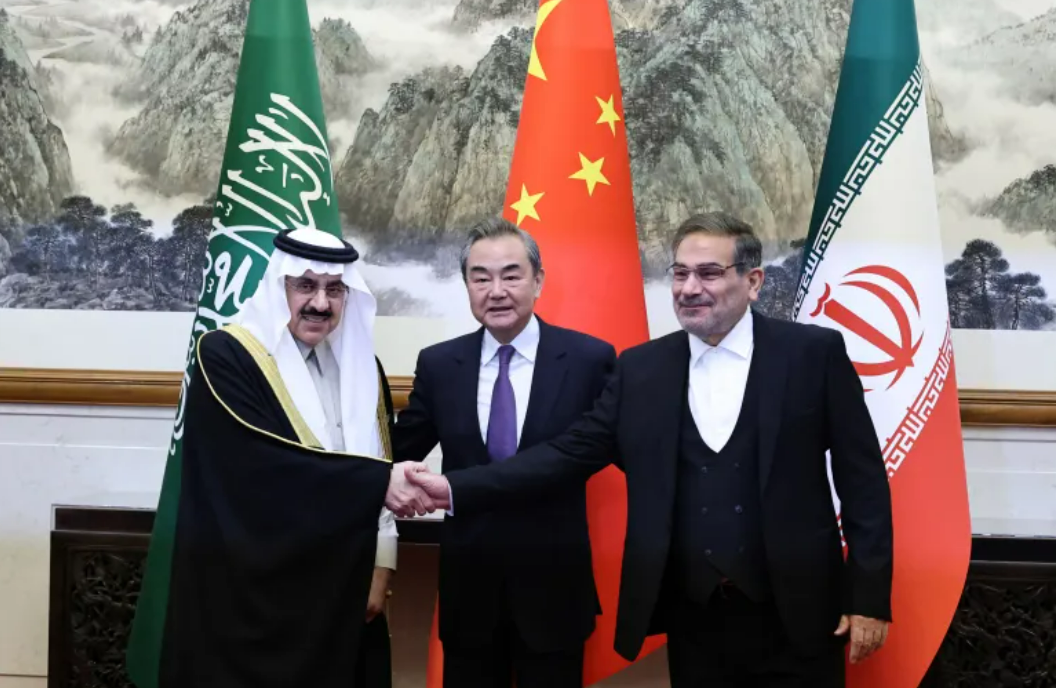Published by JNS on March 27, 2023.
Photo: A photograph released by Chinese state media showing officials Wang Yi, center, China’s top foreign policy official, with Ali Shamkhani, right, the secretary of Iran’s security council, and Musaad bin Mohammed Al Aiban, Saudi Arabia’s minister of state, in Beijing, on Friday. Source: New York Times caption, photo from China Daily via Reuters.
The headlines are hard to believe:
“Saudi Arabia and Iran Restore Relations in Deal Brokered by China”
“Russia Mediates Potential Saudi-Syria Detente, Sidelining U.S. in West Asia”
“Middle East states seek ‘mechanism’ to bring Syria back to Arab League”
“Will Erdogan and Assad soon meet to bury the hatchet?”
“After Saudi Deal, Iran Says Hopes to Restore Bahrain Ties”
Not since the Arab Spring or the emergence of ISIS in 2011 have such significant changes taken place in the Middle East.
Add to this the world’s perception that the U.S. is not only leaving the region but losing out to Chinese and Russian diplomacy.
Maria Fantappie and Vali Nasr, writing in Foreign Affairs, said, “The convergence of the broader strategic interests of China, Iran and Saudi Arabia suggests that Beijing’s breakthrough with Iran and Saudi Arabia is likely to serve as the foundation of a new geopolitical reality in the Middle East … realigning its major powers, replacing the current Arab-Iranian divide with a complex web of relationships and weaving the region into China’s global ambitions. For Beijing, the announcement was a great leap forward in its rivalry with Washington.”
Breathtaking, yes. Hyperbole, maybe. The Saudi-Iranian détente is the headline, but some major regional relationships had already been repaired. The first, a reconciliation between Qatar, Saudi Arabia and its Gulf neighbors, has already lasted two years. The Qataris still support Islamists, Hamas and Turkey, who are adversaries of the Saudis. Nonetheless, the Qatari-Saudi relationship seems stable for now, as all the parties like the economic benefits of not being at odds with each other.
But will these relations be long-standing or reversible tactical decisions that stabilize the current moment and give the parties breathing room? Skeptics will point out that mutual animosities lurk just beneath the surface and past periods of reconciliation did not last and violence followed.
The most challenging regional agreement to maintain is the Abraham Accords. The accords were greenlighted by the Saudis when they were at diplomatic odds with the Iranians and the Saudis were truly worried about their security and self-preservation. But Crown Prince Mohammad bin Salman, the de facto Saudi leader, felt betrayed by the U.S. and chose China to facilitate his détente with Iran.
Israel was blindsided. It was hoping the Saudis and the Gulf states, Egypt and Jordan would become a united bloc against an expansionist and nuclear-capable Iran. But it seems Israel is once again the odd man out, isolated and on its own.
So, why have these Muslim nations chosen this diplomatic path?
The Saudis want the Iranians to end missile attacks from the Iranian-sponsored Houthis in Yemen. Iran wants to end its diplomatic isolation and overcome American sanctions. Syria wants legitimacy and the Arab world is tired of the Syrian civil war. Russia wants stability in Syria in order to solidify Russia’s gains of an advanced air and naval base on the Mediterranean. The United Arab Emirates have already reconciled with Tehran, while the Bahrainis will follow the Saudi lead and hope for a reprieve from Iranian hegemonic ambitions.
The big loser is the U.S., which has lost influence and respect. During my visit to Saudi Arabia, Saudi diplomats and foreign policy officials told me that they consider China an equal player with the U.S. and that they felt disrespected by American policy.
The Iranians, for their part, seem empowered to take on America through their proxy forces in Iraq and Syria. Last week, an Iranian suicide drone killed a U.S. contractor and injured five U.S. service members at a coalition base near al-Hasakah.
But this series of reconciliations may not hold.
Do the Saudis believe they can have it all? That they can have perpetually stable relations with the U.S., China, Iran and the Islamist world simultaneously?
Not likely.
The Saudis’ and the Iranians’ fundamental differences remain. The Saudis are Arab, Sunni and conservative. The Iranians are Persian, Shiite, Islamist and revolutionary in their aspirations for regional hegemony. Tehran still considers Bahrain an Iranian province and Bahrain is vulnerable because it is 80% Shiite. Syria is a weak state that cannot say no to Iran, which invites continuing Israeli airstrikes that could destabilize the situation further. Hezbollah in Lebanon feels emboldened by Israel’s domestic turmoil and will do the Iranians’ bidding and harass Israel’s northern border.
Barring regime change, the reconciliation that did not and will never happen is between Israel and Iran. Iran’s fundamental desire is the end of the “Zionist regime.” Its proxies in Lebanon, Iraq and Syria will continue this mission no matter what.
What is unknown is how other nations that have cozied up to Iran will react if Israel acts against the Iranian nuclear program and increases its strikes on Iranian precision missile transfers and entrenchment in southern Syria.
Turkey is still a wildcard, as it wants a permanent presence in northern Syria, which the Syrians are against but may have to accept if their Iranian and Russian overlords press for a deal. The one inter-Arab conflict that seems most resistant to resolution is the power struggle in Libya.
With so many moving parts, along with fundamental differences that have been papered over at best, it is likely that quieting tensions between these Muslim nations is possible, but only in the short-term.
Predicting developments in the Middle East is usually a fool’s errand, with changes sometimes coming entirely unexpectedly. Did anyone see the Arab Spring—which turned into an Arab Winter, then an Arab nightmare with ISIS—coming?
